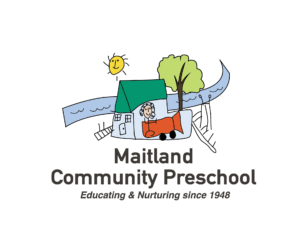Our Programs
Our experienced educators have designed a range of programs for the students of Maitland Community Preschool.
The Maitland Community Preschool program offerings give your child the opportunity to learn, play and interact. We cover topics such as recycling, health and safety, engaging with nature and transition to primary school.
Our play-based curriculum and educational practices are guided by The Early Years’ Learning Framework (EYLF). The EYLF identifies five broad learning outcomes that we will assist your child to develop, and you will see that these learning outcomes are evident in everything that we do.
The outcomes are:
• a strong sense of their identity
• connections with their world
• a strong sense of wellbeing
• confidence and involvement in their learning, and
• effective communication skills
Partnerships with families
Belonging, Being and Becoming are key themes that underpin the EYLF, and on enrolment families are asked to provide us with some information in these three areas which will help us to learn a little bit about their child, the family’s beliefs and values, and what their hopes are for their child’s preschool experience and beyond. A key part of this relationship is regular two-way communication, so that we can share achievements and progress, as well as troubleshoot any potential difficulties should they occur.
Each morning we set up a range of provisions for the children’s play. As well as the regular experiences we offer every day, we also plan other inviting learning experiences designed to provoke or extend learning, based on what we know or observe about the children’s individual and collective strengths, interests, relationships, growing abilities and needs.
This may be in response to our observations, a conversation with the family, or a child’s or children’s request. Some of these provisions are quite specific and intentional, while others are open-ended and flexible, promoting autonomy and child-led play. We aim for a balance between child-led and educator-led play, recognising the importance and benefits of each.
We have many embedded practices which ensure that our children learn about the importance of:
• Caring for our bodies (nutrition-everyday vs sometimes food; exercise- fundamental movement skills and hygiene- minimising the spread of germs, dental hygiene)
• Keeping ourselves safe – protective behaviours; learning to assess and manage own risks in play
We are on a path towards embedding more sustainable practices into our everyday routines. We actively teach the children about the 3Rs (Reducing, Recycling, and Re-using), and other forms of conservation and energy reduction and the importance of looking after our planet.
We encourage ‘nude food’ practices, teach the children how to separate their rubbish for recycling, and daily food scraps go to either our compost tumbler or the worm farm. Our rainwater tank is a great way of teaching the children about conserving this precious resource.
The benefits of children engaging with nature are well-documented, and we ensure that our children have ample opportunity for this on a daily basis.
Outdoors, we have plentiful shade provided by beautiful established trees and lots of natural materials in the form of a large sandpit, digging patch and bark area. Raised garden beds allow the children to be involved in the process of growing a wide range of plants (eg., edible, scented, decorative), and our large Tuckeroo trees provide opportunities for climbing under supervision, bird-watching, and an abundance of seed pods for ‘cooking’ activities. We include plenty of natural ‘loose part’ elements in the form of various lengths and types of tree trunk offcuts, pine cones and banksia pods, smooth pebbles etc, that the children love to incorporate into their imaginative play.
On rainy days we have rain suits for the children, and a large roof over our sandpit, meaning that we get to play outside every day, irrespective of the weather. As the saying goes… there’s no such thing as bad weather - just bad clothing!
One of our responsibilities is to assess each child’s learning and development throughout the year. We do this in the form of individual portfolios using OWNA, an online program which enables us to share learning stories and other forms of documentation to families, and in turn allows families to give us feedback, share insights, and be more involved with planning for their child’s learning.
One of our responsibilities is to assess each child’s learning and development throughout the year. We do this in the form of individual portfolios using OWNA, an online program which enables us to share learning stories and other forms of documentation to families, and in turn allows families to give us feedback, share insights, and be more involved with planning for their child’s learning.
One of our goals is to support positive transitions to school for our children, and we achieve this in various ways. Over the years we have developed good working relationships with our local feeder schools, and towards the end of the year, we contact all the schools our children are enrolled in, and with parental permission, share information that will help them to adjust well to their new educational setting; this includes Transition to School statements.
In Term 4 we go on walking excursions to nearby schools to further familiarise our children with them. Each year we also hold a School Readiness and Transition night where we invite teachers from local schools to come and talk to our families about how best to prepare their children for kindergarten.

